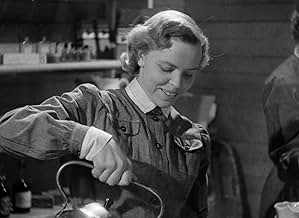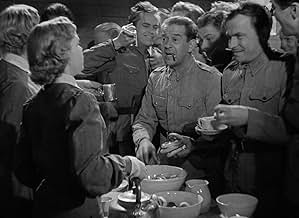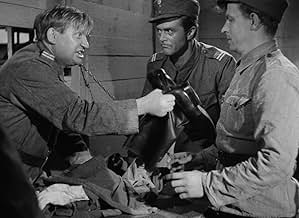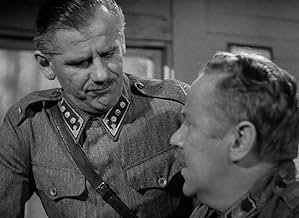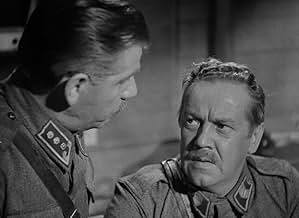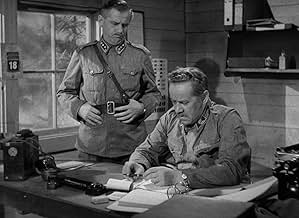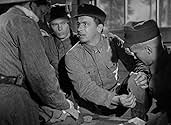Tuntematon sotilas
- 1955
- 2 घं 57 मि
IMDb रेटिंग
8.0/10
8 हज़ार
आपकी रेटिंग
अपनी भाषा में प्लॉट जोड़ेंThe tale of a platoon of soldiers during the Continuation War. Based on Väinö Linna's book of the same name.The tale of a platoon of soldiers during the Continuation War. Based on Väinö Linna's book of the same name.The tale of a platoon of soldiers during the Continuation War. Based on Väinö Linna's book of the same name.
- 1 BAFTA अवार्ड के लिए नामांकित
- 7 जीत और कुल 1 नामांकन
कहानी
क्या आपको पता है
- ट्रिवियाThe film is traditionally shown in television in Finland every year on Independence Day (December 6th) since the year 2000.
- कनेक्शनEdited into Juoksuhaudantie (2004)
- साउंडट्रैकFinlandia
by Jean Sibelius
फीचर्ड रिव्यू
Over the decades, Väinö Linna's The Unknown Soldier (1954) has become one of the most popular and beloved Finnish novels of all time, despite initial criticism and controversy about the naturalistic and gritty portrayal of the soldiers' life on the front. When the book was understandably very quickly adapted to the big screen, the directing duties were given to Edvin Laine who would later go on to direct the film adaptations of Linna's epic novel trilogy Here Under the North Star as well. Like the book, the film has become one of the cornerstones of Finnish fiction: the film is shown on television every Independence Day and the book is widely read in schools. Having read the novel twice and seen the movie several times, I can confirm that their classic reputations are very much deserved.
Set during the Continuation War (1941-44), The Unknown Soldier tells the story of a machine gun company consisting mostly of young inexperienced men from all around Finland. At the beginning, the drafted men cheerily leave for the front when the war between Finland and the USSR breaks out again after the brief Interim Peace era. Gradually they grow more and more disillusioned with their chances of ever winning the war and a grudge against the strict commanding officers grows among the company. Battle after battle old friends are killed and new soldiers brought to the front, but the men have only their own spirit to trust.
The character gallery is too numerous to be listed entirely, but all the soldiers have their place in the story and many have become commonly referenced archetypes of different types of Finnish men. It is difficult for me to pick my favourites among them, but the most essential ones include at least Antti Rokka (Reino Tolvanen), an older and very skilled soldier with an anti-authoritarian attitude, Koskela (Kosti Klemelä), a calm and respected platoon leader, and the highly uptight and often ridiculed company commander Lammio (Jussi Jurkka). Particularly Rokka has reached a legendary status in Finnish culture; his rich Karelian dialect, self-confident antics and superior skills mix excellently into an extremely entertaining and often laugh-out-loud funny character. On the other hand, Koskela and Lammio can be seen as the two opposites of leader types; in their personas, practical and theoretical approaches to leadership often clash, even if Koskela would prefer his men to not constantly provoke his superiors' anger.
At the risk of the review becoming too list-like, I cannot leave some other great characters without a mention. The personalities range from the always cheery Vanhala and Hietanen (Leo Riuttu and Heikki Savolainen) to the brooding and menacing Lehto and Lahtinen (Åke Lindman and Veikko Sinisalo), the frightened Riitaoja (Olavi Ahonen), the hilariously eccentric Honkajoki (Tarmo Manni), the business-savvy Rahikainen (Kaarlo Halttunen) and the idealistic Kariluoto (Matti Ranin). The men's diverse dialects are probably mostly lost in translation, but for Finnish-speaking viewers they provide one of the main charms of the whole film; personally I enjoy especially Rokka and Rahikainen's wide Karelian way of speech. Despite the excellent performances, I have to agree with the common criticism against the film: a lot of the actors are obviously too old for their roles and subsequently their behaviour seems overly juvenile at many points. Also, due to this the young men's age difference to the experienced Rokka is not as clear as it is said to be. The age issue does not ruin the experience though, not at all; most of the veteran actors handle their roles magnificently. The memorable performances also help the viewer to distinguish the characters from each other, as the downside of having a large cast is that the film may seem difficult to follow to those who have not read the book.
Like many screen-versions of famous novels, the film downplays the importance of the characters' inner thoughts and focuses more on the action-driven plot which is followed pretty faithfully even though some characters and subplots have been dropped. I especially wish the sadistic relationship of Lehto and Riitaoja was paid more attention in the film as it has always been one of my favourite aspects of the novel, but luckily the spectacular action scenes make up for the thinner characters. The explosions, weaponry, artillery and tanks look very authentic, making especially the final crescendo of chaotic turmoil very impressive. Many other iconic moments also belong among the most famous scenes in Finnish cinema: Lehto's big solution, Rokka single-handedly taking down dozens of Russians with a submachine gun, the tragic demise of one of the main characters in a burning ambulance... However, many of the smaller death scenes have come to look rather theatrical and oddly bloodless by modern standards. In any case, the character chemistry is excellent, thanks to Linna's writing and the charismatic actors.
Jean Sibelius' Finlandia beautifully bookends the visually gorgeous masterpiece that never feels boring despite the runtime of nearly three hours – both entertaining and serious, The Unknown Soldier belongs without a doubt among the most essential of Finnish films ever made.
Set during the Continuation War (1941-44), The Unknown Soldier tells the story of a machine gun company consisting mostly of young inexperienced men from all around Finland. At the beginning, the drafted men cheerily leave for the front when the war between Finland and the USSR breaks out again after the brief Interim Peace era. Gradually they grow more and more disillusioned with their chances of ever winning the war and a grudge against the strict commanding officers grows among the company. Battle after battle old friends are killed and new soldiers brought to the front, but the men have only their own spirit to trust.
The character gallery is too numerous to be listed entirely, but all the soldiers have their place in the story and many have become commonly referenced archetypes of different types of Finnish men. It is difficult for me to pick my favourites among them, but the most essential ones include at least Antti Rokka (Reino Tolvanen), an older and very skilled soldier with an anti-authoritarian attitude, Koskela (Kosti Klemelä), a calm and respected platoon leader, and the highly uptight and often ridiculed company commander Lammio (Jussi Jurkka). Particularly Rokka has reached a legendary status in Finnish culture; his rich Karelian dialect, self-confident antics and superior skills mix excellently into an extremely entertaining and often laugh-out-loud funny character. On the other hand, Koskela and Lammio can be seen as the two opposites of leader types; in their personas, practical and theoretical approaches to leadership often clash, even if Koskela would prefer his men to not constantly provoke his superiors' anger.
At the risk of the review becoming too list-like, I cannot leave some other great characters without a mention. The personalities range from the always cheery Vanhala and Hietanen (Leo Riuttu and Heikki Savolainen) to the brooding and menacing Lehto and Lahtinen (Åke Lindman and Veikko Sinisalo), the frightened Riitaoja (Olavi Ahonen), the hilariously eccentric Honkajoki (Tarmo Manni), the business-savvy Rahikainen (Kaarlo Halttunen) and the idealistic Kariluoto (Matti Ranin). The men's diverse dialects are probably mostly lost in translation, but for Finnish-speaking viewers they provide one of the main charms of the whole film; personally I enjoy especially Rokka and Rahikainen's wide Karelian way of speech. Despite the excellent performances, I have to agree with the common criticism against the film: a lot of the actors are obviously too old for their roles and subsequently their behaviour seems overly juvenile at many points. Also, due to this the young men's age difference to the experienced Rokka is not as clear as it is said to be. The age issue does not ruin the experience though, not at all; most of the veteran actors handle their roles magnificently. The memorable performances also help the viewer to distinguish the characters from each other, as the downside of having a large cast is that the film may seem difficult to follow to those who have not read the book.
Like many screen-versions of famous novels, the film downplays the importance of the characters' inner thoughts and focuses more on the action-driven plot which is followed pretty faithfully even though some characters and subplots have been dropped. I especially wish the sadistic relationship of Lehto and Riitaoja was paid more attention in the film as it has always been one of my favourite aspects of the novel, but luckily the spectacular action scenes make up for the thinner characters. The explosions, weaponry, artillery and tanks look very authentic, making especially the final crescendo of chaotic turmoil very impressive. Many other iconic moments also belong among the most famous scenes in Finnish cinema: Lehto's big solution, Rokka single-handedly taking down dozens of Russians with a submachine gun, the tragic demise of one of the main characters in a burning ambulance... However, many of the smaller death scenes have come to look rather theatrical and oddly bloodless by modern standards. In any case, the character chemistry is excellent, thanks to Linna's writing and the charismatic actors.
Jean Sibelius' Finlandia beautifully bookends the visually gorgeous masterpiece that never feels boring despite the runtime of nearly three hours – both entertaining and serious, The Unknown Soldier belongs without a doubt among the most essential of Finnish films ever made.
- random_avenger
- 24 सित॰ 2010
- परमालिंक
टॉप पसंद
रेटिंग देने के लिए साइन-इन करें और वैयक्तिकृत सुझावों के लिए वॉचलिस्ट करें
- How long is The Unknown Soldier?Alexa द्वारा संचालित
विवरण
बॉक्स ऑफ़िस
- बजट
- FIM 4,66,67,761(अनुमानित)
- चलने की अवधि2 घंटे 57 मिनट
- रंग
- पक्ष अनुपात
- 1.37 : 1
इस पेज में योगदान दें
किसी बदलाव का सुझाव दें या अनुपलब्ध कॉन्टेंट जोड़ें


